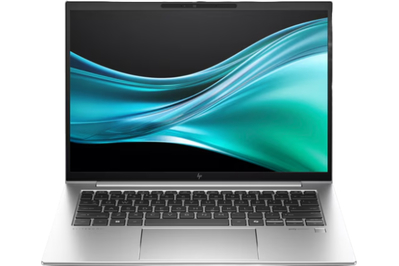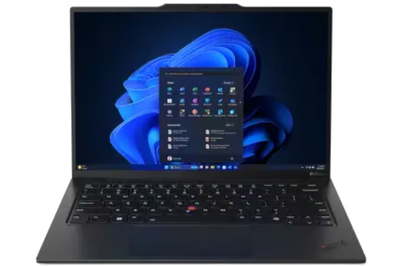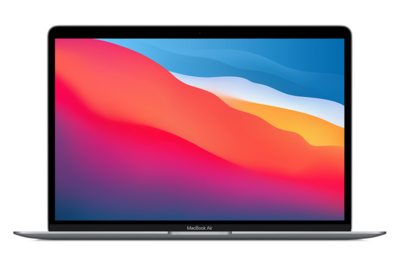A good business laptop works quickly, offers great battery life, and has a few extra ports in case you need to plug into a meeting-room TV, or if a client hands you an older, USB-A thumb drive. These laptops should also be easier and cheaper to repair, so you won’t lose access to your files and communication for long when something breaks.
All of those features can make business laptops chunky and unwieldy, but we found that the HP EliteBook 840 G11 matches the processing power and battery life of an ultrabook and puts it all in a thin and repairable package. If you’re looking for an even slimmer laptop with more customizable options, we also recommend the Lenovo ThinkPad X1 Carbon Gen 12.
Everything we recommend
Top pick
This HP model is a well-rounded business laptop with a variety of ports and a repairable design.
Buying Options
Upgrade pick
This Lenovo model feels like a slim ultrabook rather than a business laptop, and it’s almost as repairable as our top pick.
Budget pick
This version of the MacBook Air isn’t really a business laptop, but it’s inexpensive and powerful enough to get work done.
Buying Options
Top pick
This HP model is a well-rounded business laptop with a variety of ports and a repairable design.
| Processor: | Intel Core Ultra 5 135U | Storage: | 512 GB |
| Graphics: | Intel | Screen: | 1920×1200 IPS |
| Memory: | 16 GB | Weight: | 3.13 pounds |
| Tested battery life: | 12 hours |
The HP EliteBook 840 G11 is a versatile business laptop that offers solid performance, a wide selection of ports, and a 12-hour battery life. It has a large, easy-to-use trackpad and comfortable keys, as well as a high-res webcam with a privacy cover. Competing ultrabooks have better screens and slimmer builds, but the EliteBook 840 G11 provides similar performance—and unlike most ultrabooks, it can be completely disassembled for repair.
Upgrade pick
This Lenovo model feels like a slim ultrabook rather than a business laptop, and it’s almost as repairable as our top pick.
| Processor: | Intel Core Ultra 5 135U | Storage: | 512 GB SSD |
| Graphics: | Intel | Screen: | 1920×1200 IPS, touch |
| Memory: | 16 GB | Weight: | 2.5 pounds |
| Tested battery life: | 15.4 hours |
The Lenovo ThinkPad X1 Carbon Gen 12 is slimmer, lighter, and more configurable than our top pick. It also has a touchscreen, as well as the longest battery life of the laptops we tested, lasting more than 15 hours. You can upgrade its display to a 2.8K OLED version, a welcome higher-resolution option in comparison with the 1080p displays found on most of the business laptops we tested.
Budget pick
This version of the MacBook Air isn’t really a business laptop, but it’s inexpensive and powerful enough to get work done.
| Processor: | Apple M1 | Storage: | 256 GB SSD |
| Graphics: | Apple M1 | Screen: | 13.3-inch 2560×1600 |
| Memory: | 8 GB | Weight: | 2.8 pounds |
| Tested battery life: | 14.4 hours |
The Apple MacBook Air (M1, 2020) doesn’t have many of the features that are important for a business laptop, such as a variety of ports or a user-repairable design. However, its processing power, battery life, and display far outpace those of any similarly priced Windows option, and Apple’s worldwide network of retail stores makes it easy to get the laptop repaired or replaced.
Why you should trust us
I’m a senior staff writer at Wirecutter covering monitors, laptops, tablets, and 3D printers. I specialize in devices designed for professionals, such as the best laptops for photo and video editors. I’ve also been building and repairing my own computers for nearly 20 years.
For this guide:
- I spent a week researching more than a dozen potential candidates to test, eventually testing six business laptops over two weeks.
- I attended CES 2024, one of the biggest tech trade shows of the year, to preview upcoming business laptops.
- I spoke with a variety of sources, from a small-business owner to electronics-repair shop owners, about everything from a business’s IT needs to the importance of upgradable memory.
- Like all Wirecutter journalists, I review and test products with complete editorial independence. I’m never made aware of any business implications of my editorial recommendations. Read more about our editorial standards.
- In accordance with Wirecutter standards, I return or donate all products I’ve tested once my assessment of them is complete. I never hang on to “freebies'' once testing is done.
Who this is for
Whether you run a small business and need a new computer for it or simply want a longer-lasting laptop, you need to decide whether you want an ultrabook or a business laptop. Ultrabooks are typically thin, light, and cheap, while business laptops are chunkier, pricier, and more repairable.
The two kinds of laptops have the same exact processing power, and we put business laptops through the same performance tests as ultrabooks. But business laptops are fundamentally different from ultrabooks because they’re designed to be taken apart.
Rather than using glue and solder to connect components together, which can make them nearly impossible to detach, manufacturers of business laptops design them with sockets that make replacing key components easy. Repair techs we spoke to said that both storage and RAM should be upgradable on a business laptop, unless the client specifically needs a light and thin machine. Storage and RAM constitute two of the most important aspects of a computer’s performance. Because these components can be swapped or upgraded on business laptops, if in the future you run out of hard-drive space or find that you’re constantly running too many applications and using all your RAM, you can add more. Business laptops also make smaller parts such as the speakers, keyboard, and power button easier to remove and replace.
That kind of repairability is important because not having access to your client files, financial information, or any other key business information is a critical setback. Small-business owners told us that their number one concern is being able to pull up information and make decisions quickly, and having a reliable computer is nonnegotiable. Business laptops are built to be repaired by internal IT departments to ensure as little downtime as possible.
As a result, when you’re considering a business laptop, it’s important to be realistic about the practicality of repair. Although business laptops are more repairable than most other laptops, it’s not necessarily a do-it-yourself process, or a remedy for anything that can go wrong. Unless you feel comfortable troubleshooting, ordering parts online, and opening up the back of a laptop to swap those parts, confirm that you have at least one dependable computer-repair shop that you can access. You might also find that after years of use, the laptop isn’t worth repairing due to wear and tear, or that it has fallen behind in terms of performance. But if you spill a drink on your keyboard or crack your screen, a business laptop will undoubtedly be easier to repair than a model for home use.
How we picked

Shopping for a business laptop is different from buying an ultrabook, but the most important things to look for aren’t all that different:
- Performance: A business laptop should be able to run any modern office software, so we considered Windows laptops with the latest processors, those in the Intel Core Ultra line. Although Apple laptops don’t meet most of our criteria for this guide, the M1 chip in the 2020 MacBook Air still competes favorably against the most power-efficient Windows options for a fraction of the price, so we considered it as a budget pick. If you need a faster processor or a dedicated GPU for gaming, photo and video editing, or other work, check out our gaming laptop and pro laptop guides.
- Great keyboard: Business laptops are the quintessential document and spreadsheet devices, so their keys and keyboard layouts should be comfortable to use over long periods. We strongly prefer a backlight.
- Accurate trackpad or pointing device: Though business laptops should be sturdy, most wouldn’t be able to survive your throwing them at a wall in reaction to trackpad frustrations. We prefer Microsoft Precision Touchpads because they’re accurate and compatible with Windows 11’s multitouch trackpad gestures.
- 14-inch IPS screen: We prefer 14-inch business laptops because they’re more pleasant for editing large documents or spreadsheets than 13-inch laptops, yet they’re still smaller and lighter than 15-inch laptops. Most business laptops have 1080p screens that keep text and images sharp, with lots of room to fit more information, and use IPS panels (rather than TN panels) to improve color accuracy and viewing angles. A handful have taller screens with a 1920×1200 resolution, which are just as sharp but provide more vertical pixels.
- Wide range of ports: We prefer systems with a mix of old and new ports for maximum flexibility. Every laptop we consider for this guide offers at least one USB-C port (which you can use to link external monitors, charge the laptop, and connect USB-C accessories), a USB-A port, and an HDMI port. Not every system we test provides an SD or microSD card reader or an Ethernet jack, but we definitely prefer to have those. Thunderbolt 4 is optional, as are additional display outputs such as DisplayPort or VGA.
- Good battery life: We prefer at least eight hours of battery life—enough for a full workday or a coast-to-coast flight plus time spent waiting at the airport. Even business laptops no longer include swappable external batteries.
- Reasonable size and weight: Business laptops are usually larger and heavier than ultrabooks, partly because they’re built to be sturdier and partly because components such as removable memory take up more space than non-upgradable parts. But every laptop we’ve tested for this guide has weighed less than 4 pounds, and most models weigh less than 3.5 pounds.
- Upgradable and repairable: Although we have considered a few thin and light ultrabook-esque laptops, the majority of models we look at for this guide are designed to be opened and serviced easily. The laptop should allow you to get at the SSD bay or slot, as well as the battery, with minimal effort; access to at least one RAM slot and the Wi-Fi card is a plus. And the laptop should let you replace the keyboard and other parts without forcing you to take the entire thing apart or to replace a bunch of other, unrelated components.
- Competitive (if not low) price: Business laptops are typically more expensive than budget ultrabooks or cheap laptops. Their prices fluctuate widely depending on discounts and coupon codes, but in general you should expect to spend between $1,100 and $1,500 for a good business laptop and between $1,600 and $2,000 for an outstanding one. Because most are designed to be upgraded, you can sometimes save money on memory and storage upgrades if you’re willing to do them yourself. And by being easier to upgrade and repair, a business laptop can give you better long-term value despite costing more up front.
- Fingerprint reader or IR camera for speedier logins: Most business laptops offer a fingerprint reader for a nominal fee; some have infrared cameras that can scan your face instead. Technology improvements and Windows 11’s Windows Hello feature make logging in with your finger or face more reliable and predictable than it used to be.
The models we considered in our latest round of tests all came from Apple, Dell, HP, Lenovo, and Samsung because those are the only companies dedicated to building and maintaining a range of computers specifically for businesses. But we have also researched and tested models from Acer, Asus, Fujitsu, and Toshiba in the past.
How we tested
We tested each laptop for at least two days of ordinary work—namely, loading up and switching among a couple dozen browser tabs, using Google Docs, Google Sheets, and Slack constantly, and playing music and video. This process gave us a feel for each laptop’s keyboard, trackpad, screen, and general performance on common work tasks.
To test the batteries, we used a Spyder5Pro colorimeter to set each laptop’s screen backlight to 150 nits (or candelas per square meter, cd/m2) and ran a web-browsing battery test that cycled through web pages, email, Google Docs, and video. We ran the test twice on each laptop and averaged the results.
We also removed the bottom panel from each laptop and noted how many screws (and other things, if applicable) we would need to remove to access the memory, storage, and internal battery for repair or replacement. Replacing major components in a business laptop should be easier than it is for a regular ultrabook, but replacing a screen, motherboard, or keyboard yourself can still void the warranty, so we didn’t test this firsthand.
Our pick: HP EliteBook 840 G11

Top pick
This HP model is a well-rounded business laptop with a variety of ports and a repairable design.
| Processor: | Intel Core Ultra 5 135U | Storage: | 512 GB |
| Graphics: | Intel | Screen: | 1920×1200 IPS |
| Memory: | 16 GB | Weight: | 3.13 pounds |
| Tested battery life: | 12 hours |
The HP EliteBook 840 G11 offers strong performance, a screen that looks better than those on similarly priced business laptops, and a long, 12-hour battery life, all without sacrificing repairability.
It's powerful enough for most office work. In our tests, the EliteBook 840 G11 easily handled web browsing in two Chrome windows full of tabs alongside multiple Excel and Word documents. We also streamed music and video in the background on Spotify and YouTube, which had no impact on the machine’s working performance. However, this laptop is really not meant for any kind of photo or video editing, or any media work other than simple graphic design.




